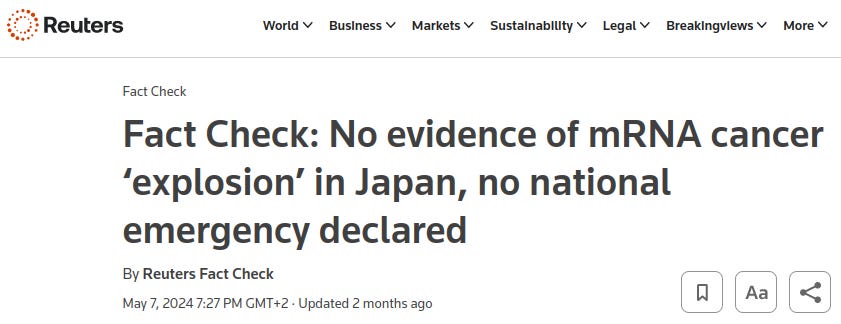Japanese study showing an increased age-adjusted cancer mortality after the 3rd mRNA vaccine dose RETRACTED: It is time to stop the outrageous censorship of science!
One more scientific study that challenges the established narrative gets retracted.
Since the beginning of the COVID-19 pandemic several scientific articles have been retracted. Unfortunately, this time was the turn of the article titled “Increased Age-Adjusted Cancer Mortality After the Third mRNA-Lipid Nanoparticle Vaccine Dose During the COVID-19 Pandemic in Japan” by Miki Gibo, Seiji Kojima, Akinori Fujisawa, Takayuki Kikuchi and Masanori Fukushima (Figure 1), which has been retracted from the journal Cureus on June 26th, 2024.
Figure 1. Screenshot taken from the webpage https://www.cureus.com/articles/196275-increased-age-adjusted-cancer-mortality-after-the-third-mrna-lipid-nanoparticle-vaccine-dose-during-the-covid-19-pandemic-in-japan?authors-tab=true#!/.
According to the study performed in Japan, the age-adjusted death rates for leukaemia, breast, pancreatic, and lip/oral/pharyngeal cancers increased significantly in 2022 after a large portion of the Japanese population had received the third dose of the mRNA vaccine, as compared to 2020 (the first year of the pandemic), when no mass vaccinations were given (Gibo et al., 2024). The scientific study, which analyzed publicly available national data, went through a rigorous peer-review process and was regularly accepted for publication on April 8th, 2024.
However, the results of the Japanese study clashed with the “safe and effective” established narrative, and therefore, the entire fact-checking apparatus immediately rushed to smear the quality of its data (Figure 2).
Figure 2. Screenshot taken from the webpage https://www.reuters.com/fact-check/no-evidence-mrna-cancer-explosion-japan-no-national-emergency-declared-2024-05-07/.
On June 12th, 2024, Mr. Graham Parker-Finger, the Director of Publishing for the Cureus Journal of Medical Science, wrote a notification e-mail to the authors citing specifically the aforementioned article by the Reuters Fact Check, and on the same day an expression of concern has been issued under the supervision of the Monitoring Editors, Dr. Alexander Muacevic and Dr. John R. Adler, tasked with conducting a post-publication review (Figure 3).
Figure 3. Screenshot taken from the webpage https://www.ncbi.nlm.nih.gov/pmc/articles/PMC11169744/.
The final decision of the post-publication review was: RETRACTION.
In summary, the two Editor-in-Chief and the Director of Publishing for the Cureus Journal of Medical Science decided to retract a scientific study written by 5 medical professionals, which has ~280,000 reads, on the basis of a fact-checking article published on the website of a News Agency! To make matters worse, the fact that they retracted the article just 14 days after the expression of concern was issued raises questions, because it suggests that they did not thoroughly review the data in such a short amount of time. In fact, at the time of writing, there is only a brief justification for the retraction on the Cureus website, rather than a extensive motivation supported by solid scientific evidence:
“The Editors-in-Chief have retracted this article. Upon post-publication review, it has been determined that the correlation between mortality rates and vaccination status cannot be proven with the data presented in this article. As this invalidates the conclusions of the article, the decision has been made to retract.”
Since when the Editorial Board of a scientific journal judges scientific studies on the basis of poorly written, not backed by scientific data and not peer-reviewed fact-checking articles?
Furthermore, it is worthy of note, that the Chairman of the Thomson Reuters Foundation, James C. Smith, is a Pfizer Board Member (Figure 4).
Figure 4. Screenshot taken from the webpage https://www.pfizer.com/people/leadership/board_of_directors/james_smith.
Is there a conflict of interest underlying the withdrawal of the Japanese study, which shows a significant increase in the age-adjusted death rates for several cancer types following the widespread administration of the third dose of mRNA vaccines to the Japanese population? At the moment, there is no certain answer, just a lot of food for thought…
What is certain though, is that I will never in my career consider submitting an article to Cureus, and I will strongly discourage any of my colleagues who may eventually ask me. In fact, by this decision Cureus appears to prioritize non-scientific, non-peer-reviewed, private owned fact-checking agencies (which, by the way, proved to be wrong even in front of the evidence during the pandemic, e.g. Figure 5), ahead of rigorous scientific procedures that have been in place for centuries, like the peer-review process.
Figure 5. Screenshot taken from the webpage https://tnc.news/2022/10/18/reuters-fact-check-pfizer/.
Such form of censorship must be strongly condemned and opposed by the scientific community as a whole, since it seriously threatens to erode the foundation of the unbiased scientific method and progress.
References
Gibo M, Kojima S, Fujisawa A, et al. Increased Age-Adjusted Cancer Mortality After the Third mRNA-Lipid Nanoparticle Vaccine Dose During the COVID-19 Pandemic in Japan. Cureus; 16. Epub ahead of print April 8, 2024. DOI: 10.7759/cureus.57860.
Fact Check: No evidence of mRNA cancer ‘explosion’ in Japan, no national emergency declared. Reuters, May 7, 2024, https://www.reuters.com/fact-check/no-evidence-mrna-cancer-explosion-japan-no-national-emergency-declared-2024-05-07/ (May 7, 2024, accessed June 26, 2024).
Gibo M, Kojima S, Fujisawa A, et al. Expression of Concern: Increased Age-Adjusted Cancer Mortality After the Third mRNA-Lipid Nanoparticle Vaccine Dose During the COVID-19 Pandemic in Japan. Cureus; 16: x58.
https://www.pfizer.com/people/leadership/board_of_directors/james_smith
Faulkner H. Reuters stumbles in attempt to “fact check” Pfizer Covid transmission scandal, https://tnc.news/2022/10/18/reuters-fact-check-pfizer/ (2022, accessed June 27, 2024).









In your postscript to the article you say "The content posted on this account will always be available for fee.". Perhaps you meant to type "free".
Thanks for publicizing and analyzing the retraction.
I wonder which scientific journals do a transparent peer review (where the reviewers names are published) and stand by their authors until reasonable doubt is expressed to them by credible critics. Is there, for example, a journal structured along the cooperative model where the authors and reviewers are the owners and vote for the editors and managers as well as deciding criteria for funding and membership (ie excluding or at least publishing conflicts of interest and down-weighting content from such people).